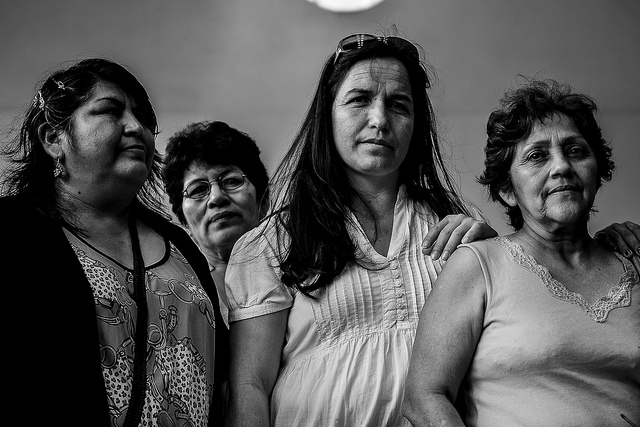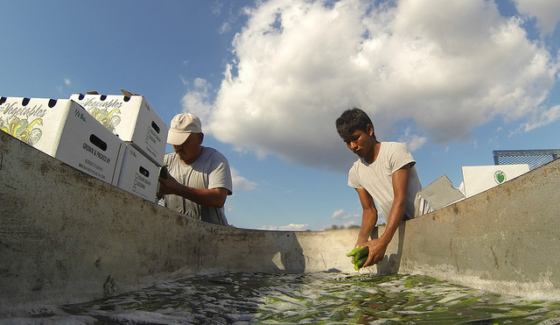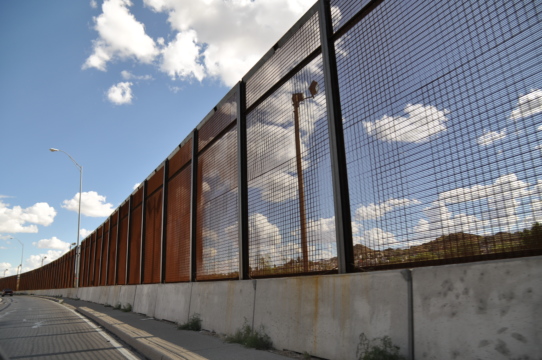
Politics & Possibilities for Immigration Reform
The surge of child migrants from Central America has put the issue of immigration back on the table.
It’s August in Washington, DC, and the afternoon has reached its peak temperature. I’ve traded an air-conditioned DuPont Circle office for sun-scorched streets to conduct public polling of Central American immigrants. I’m now in Mt. Pleasant, a neighborhood with a large Central American population, observing as the bus picks up three and drops off two, children tug on their mother’s dress, and strangers exchange a smile as they both enter a small grocery store.
I pull out a single sheet of paper and pace towards a man in a sweat-stained baseball cap unlocking his bike in front of a Subway. I tell him that we’re doing a project on the Latin American community of DC, and I ask him if he has a moment to talk. He says he would love to help, and I begin with my questions.
This survey is structured, and a single response could be recorded in a matter of a minute—but each takes about five. When I ask people for peepholes into their lives, they give me a window. They pour out their histories, they share their current lives. Some are very thankful of what they’ve accomplished in a few short years in the US; they support their family members in their home countries with monthly money transfers. Others left war and extreme poverty to chase an American dream, and in this unfamiliar place, they have struggled to make ends meet. Each story is uniquely captivating.
The man holds his bicycle as he tells me that he misses the pace of life in Honduras. He thinks everyone here is too stressed, too worried about money. He sends part of his paycheck home to his parents, but knows that it won’t change everything. It’s the same thing here, he tells me. More money helps, but life presents other challenges. He’s taking it day by day, just like he used to in Honduras.
A quiet Guatemalan woman sitting on a park bench welcomes me to sit with her, and she maintains eye contact as her deep, brown eyes fill with tears. Her husband abandoned her family, leaving them hungry, so she came here with her oldest child, leaving her youngest behind. “People back home have nothing,” she says. She can’t even compare it to how little she has here. They have nothing.
A middle-aged Salvadorian man who just finished his shift at a restaurant tells me that he married young and moved to the US with his wife, escaping a violent city with hopes of providing for their children. Days are tough, he reflects, but with him and his wife working full time, he’s so proud that his oldest son now knows how to read and write better than he ever did.
A woman in a work uniform looks like she was in a hurry crossing the street, but when I ask if she had a moment, she gives me a flattered smile and we walk to the shade of a tree to chat. She thanks God for her life in the US, but dreams of going home every day. When I thank her for her time, she says she is grateful I talked to her. “God bless you,” she tells me.
Why are these immigrants so generous with their stories? These men and women owe me nothing. To them, I am just a stranger—just a young woman with a folder and some questions. I do not give them money for their time, no information to follow up with our organization. I was thus profoundly puzzled the first time I went to survey at Mt. Pleasant at how almost every single person is not only willing to talk to us, but happy to do so. I think back on how I always respond when I get a survey phone call: an eye roll and an exclamation that I’m not interested, even before they have a chance to tell me their cause.
On Mt. Pleasant, I’ve never gotten an eye roll, never a rude comment. The interviewees halt their lives and share things that I would never want a stranger to know: how they didn’t make it past 3rd grade, how they can’t read, how their income is below $15,000 a year; or how they crossed the border illegally and still haven’t attained citizenship, although they’re trying. Their vulnerability is remarkable and heartbreaking.
Immigration is identified as an important political issue in this nation. And consequently, politicians fill campaign speeches with promises: to build a higher wall, to grant a path to citizenship, or to never grant any amnesty at all. Some call for more border patrol agents or more work visas, while others lobby for the exact opposite.
Among the frenzy of disagreement and media fascination with politicians’ inflated statements, it can be hard to remember what I was reminded of every day on Mt. Pleasant. These immigrants should not be reduced to a statistic, and they are more than just a symbol of how our wall needs to be taller. They are people whose eyes water when they talk about something painful and who smile when they talk about their children. They are people that can be so impressively optimistic in the face of adversity, and they can be beaten down by what life has thrown at them. They are people who work long hours, and they love their families that they haven’t seen in years. They are people who treasure their own tales of heartbreak and of moments of success—they believe in what the United States can offer and labor every day to find it. They are you and I.
Some of the immigrants I spoke with left their home countries decades ago, to the point where friends of the past are just a delicate memory. They’ve lived in the United States for years, but they are hardly ever considered Americans. They are given judging looks when they speak broken English, and some live in constant fear of deportation and separation from their families. It’s their birth nation moving on without them and their chosen nation overlooking them. It’s a lack of space to voice an opinion; it’s a feeling of invisibility and unimportance.
They are eager to be heard. Ask.
The surge of child migrants from Central America has put the issue of immigration back on the table.
This report offers recommendations for Central American governments seeking to leverage the economic activities of migrants in a more integral manner.
A compilation of the Dialogue’s reports, articles and presentations on the most important issues shaping migration flows in the Central American region.
 www.flickr.com/photos/cotidianomujer/14032466256/
www.flickr.com/photos/cotidianomujer/14032466256/

